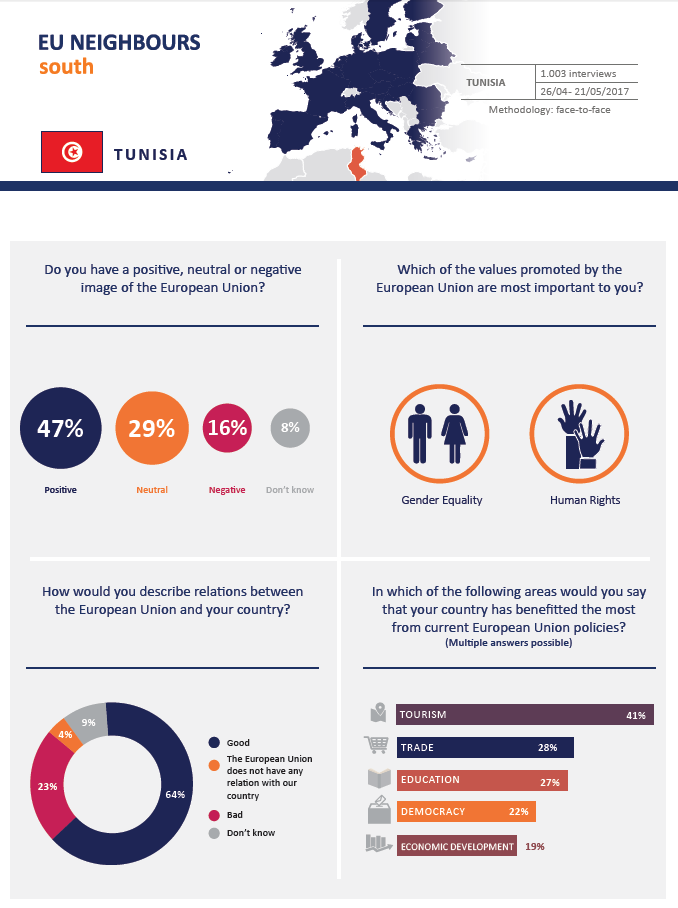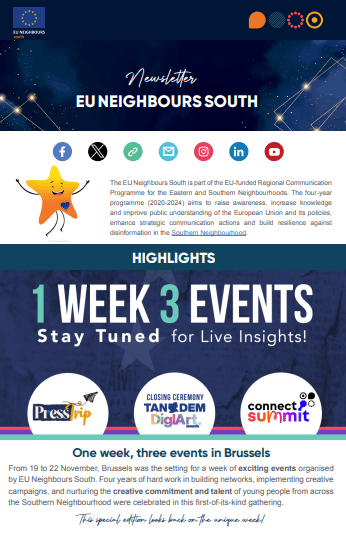
Poll shows most Tunisians think EU has good relations with their country
Almost two-thirds of Tunisians feel their country has good relations with the European Union, and most say the EU has a positive influence on development in their country, with almost eight out of ten saying the EU’s financial support to Tunisia is effective – just some of the findings of the latest annual opinion poll in Tunisia, published by the EU Neighbours South project.
The survey – part of a wave of opinion polls carried out in seven southern Mediterranean partner countries – was conducted in Tunisia from April-May 2017, with 1,003 people consulted in face-to-face interviews. Respondents were asked about their general perceptions of the EU and the values with which it is associated, about EU relations with their country, and the impact of EU financial support. The surveys also look at preferred sources of information, how people feel about their personal situation and the situation in their country, and their expectations for the future.
In general, Tunisians were less positive in their perceptions of the EU than the regional average for the three Maghreb countries (Algeria, Morocco, Tunisia), a trend reflecting a slightly less optimistic outlook about the situation in their country, and life in general.
Asked to describe relations with the EU, 64% said they were good, compared to an average of 76% in the Maghreb. Fifty-two per cent of those asked saw the EU as an important partner, while 54% felt the EU had a positive influence on socio-economic development in their country (65% Maghreb average). Tunisians overwhelmingly saw EU financial support as effective (79%, compared to 88% regional average).
In more general terms, 47% of those asked had a positive image of the EU, compared to the Maghreb average of 62%, while 29% had a neutral image and just 16% a negative image. As in other countries of the region, the values most frequently associated with the EU were human rights and equality between men and women; those least associated with the EU were peace and security, and an absence of corruption.
Tunisians feel EU support has contributed the most to tourism (41%) and trade (28%) in their country, and are keen for the EU to play a greater role in the areas of economic development, trade and human rights.
Television – both public and private – remains by far the main source of information for news in Tunisia (cited by 62% and 64% of respondents respectively), followed by radio (35% for public radio and 34% for private), then social media (32%) and the Internet (27%). Readership of the written press, is weak, with just 11% citing public press and 17% reading privately owned newspapers (compared to 34% and 32% per cent respectively in neighbouring Algeria).
Tunisians are generally satisfied with their lives (72%, compared to an average of 79% for the Maghreb), but worried about the economic situation in their country (67% feel it is bad, compared to 43% in the region). But they are hopeful that things will improve over the next 12 months, with 41% expecting their life in general to be better (14% worse) and 32% expecting an improved economic situation in the country (21% worse).
The EU Neighbours South regional overview report and factsheets are available here.
To find out more about EU – Tunisia cooperation and partnership, go here.

 Syria *
Syria *


